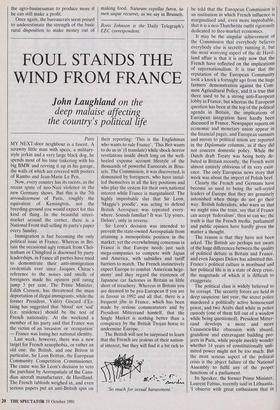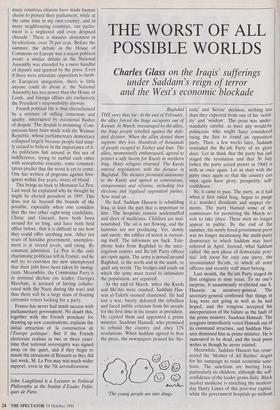FOUL STANDS THE WIND FROM FRANCE
John Laughland on the
deep malaise affecting the country's political life
Paris MY NEXT-door neighbour is a fascist. A scrawny little man with specs, a military- style jerkin and a very large black dog, he spends most of his time tinkering with his big BMW and revving it up in his garage, the walls of which are covered with posters of Rambo and Jean-Marie Le Pen.
Now, every country has its racists, as the recent spate of neo-Nazi violence in the new Germany shows. But this is the 7th arrondissement of Paris, roughly the equivalent of Kensington, not the breeding-ground you would expect for this kind of thing. In the beautiful street- market around the corner, there is a National Front stall selling its party's paper every Sunday.
Immigration is fast becoming the only political issue in France. Whereas in Bri- tain the occasional ugly remark from Chel- tenham or Chingford is disowned by party leaderships, in France all parties have tried to demonstrate their anti-immigration credentials ever since Jacques Chirac's reference to the noises and smells of foreigners made his opinion poll rating jump 5 per cent. The Prime Minister, Edith Cresson, has threatened the mass deportation of illegal immigrants, while the former President, Valery Giscard d'Es- taing has suggested that 'blood' not 'soil' (i.e. residence) should be the test of French nationality. At the weekend a member of his party said that France was the victim of an 'invasion' or 'occupation' — France was losing her national identity.
Last week, however., there was a new target for French xenophobia, or rather an old one: the British, and one Briton in particular, Sir Leon Brittan, the European Community Competition Commissioner. The cause was Sir Leon's decision to veto the purchase by Aerospatiale of the Cana- dian aircraft manufacturer, de Havilland. The French tabloids weighed in, and even serious papers put an anti-British spin on their reporting: 'This is the Englishman who wants to rule France', 'This Brit wants to do us in' (I translate) while shock-horror revelations inside dwelt long on the well- heeled expense account lifestyle of the thousands of powerful Eurocrats in Brus- sels. The Commission, it was discovered, is dominated by foreigners, who have instal- led themselves in all the key positions and who play the system for their own, national interest while France is marginalised. The highly improbable Slur that Sir Leon, 'Maggie's poodle', was acting to defend British Aerospace was repeated every- where. Sounds familiar? It was 'Up yours, Delors', only in reverse.
Sir Leon's decision was intended to prevent the state-owned Aerospatiale from attaining a monopolistic position in the market; yet the overwhelming consensus in France is that Europe needs just such mega-companies to compete with Japan and America, with subsidies and tariff barriers to match. The French instinctively expect Europe to combat 'American hege- mony' and they regard the existence of Japanese car factories in Britain as little short of treachery. Whereas in Britain you are deemed to be pro-European if You are in favour in 1992 and all that, there is a frequent jibe in France, which has been made by serious commentators and by President Mitterrand him§elf, that the Single Market is nothing better than a conspiracy by the British Trojan horse to undermine Europe.
The British will not be surprised to learn that the French are jealous of their nation- al interest, but they will find it a bit rich to So much for sexual harassment.' be told that the European Commission is an institution in which French influence is marginalised and, even more improbable, that it is a neo-Thatcherite outfit rigorously dedicated to free-market economics.
It may be the singular achievement of the Commission that everybody believes everybody else is secretly running it, but the most worrying aspect of the de Havil- land affair is that it is only now that the French have reflected on the implications of supernationalism. It is true that the reputation of the European Community took a knock a fortnight ago from the huge farmers' demonstration against the Com- mon Agricultural Policy, and it is true that there used to be a strong anti-European lobby in France; but whereas the European question has been at the top of the political agenda in Britain, the implications of European integration have hardly been discussed in France. Newspaper reports on economic and monetary union appear in the financial pages, and European summits and moves to political union are reported in the Diplomatie columns, as if they did not concern domestic policy. While the Dutch draft Treaty was being hotly de- bated in Britain recently, the French were almost entirely oblivious of its very exist- ence. The only European news story that week was about the import of Polish beef.
Clearly the French and Germans have become so used to being the self-styled leaders of Europe that they are genuinely astonished when things do not go their way. British federalists, who warn us that we might miss the train, say that if France can accept 'federalism', then so can we: the truth is that the French media, parliament and public opinion have hardly given the matter a thought. The reason is that they have not been asked. The British are perhaps not aware of the huge differences between the quality of political debate in Britain and France, and even Jacques Delors has admitted this. France's political culture is moribund and her political life is in a state of deep crisis, the magnitude of which it is difficult to exaggerate. The political class is widely believed to be corrupt. The security forces are held in deep suspicion: last year, the secret police murdered a politically active homosexual priest, and two Arabs died while in police custody (one of them fell out of a window while being questioned). President Mitter- rand develops a more and more Ceausescu-like obsession with absurd, grandiose and extravagant building pro- jects in Paris, while people meekly wonder whether 14 years of constitutionally unli- mited power might not be too much. But the most serious aspect of the political crisis is the abject failure of the National Assembly to fulfil any of the proper functions of a parliament.
Its Speaker, the former Prime Minister, Laurent Fabius, recently said in Lithuania, 'I observe with great enthusiasm that in
many countries citizens have made human chains to protect their parliament, while at the same time in my own country, and in many neighbouring countries, our parlia- ment is a neglected and even despised charade.' There is massive abstention in by-elections, over 70 per cent. Before the summer, the debate in the House of Commons on Europe was a major political event: a similar debate in the National Assembly was attended by a mere handful of deputes and ignored by the press. Even if there were articulate opposition to furth- er European integration, there is little anyone could do about it: the National Assembly has less power than the House of Lords, and foreign affairs are exclusively the President's responsibility anyway.
French political life is thus characterised by a mixture of stifling consensus and apathy, interrupted by occasional flashes of despair. The despair is mounting. Com- parisons have been made with the Weimar Republic, whose parliamentary democracy collapsed largely because people had simp- ly ceased to believe in the importance of it. As politicians fish around in this sea of indifference, trying to outbid each other with xenophobic remarks, some commen- tators predict that the worst is yet to come. One has written of pogroms against fore- igners within five years, rivers of blood.
This brings us back to Monsieur Le Pen. Last week he explained why he thought he might be elected president in 1995. This does not lie beyond the bounds of the possible, especially when one considers that the two other right-wing candidates, Chirac and Giscard, have both been around for so long, and have both held office before, that it is difficult to see how they could offer anything new. After ten years of Socialist government, unemploy- ment is at record levels, and rising. By common admission, Le Pen is the only charismatic politician left in France, and he will try to convince the new unemployed that their jobs have been taken by immig- rants. Meanwhile, the Communist Party is in terminal decline (its leader, Georges Marchais, is accused of having collabo- rated with the Nazis during the war) and thus there will be a large mass of floating extremist voters looking for a party.
France has never had much success with parliamentary government. No doubt this, together with the French penchant for drawing up new constitutions, explains the initial attraction of `la construction de l'Europe politique'. But if the French electorate realises in two or three years' time that national sovereignty was signed away on the quiet, and if they begin to resent the intrusions of Brussels as they did last week, M. Le Pen may win much wider support, even in the 7th arrondissement.
John Laughland is a Lecturer in Political Philosophy at the Institut d'Etudes Politi- ques de Paris.



























































 Previous page
Previous page